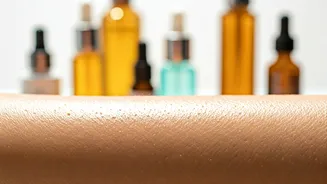Touching Your Face
One of the most frequent and often overlooked habits is touching your face. Throughout the day, our hands come into contact with numerous surfaces, accumulating
dirt, bacteria, and oils. When these contaminants are transferred to the face, they can clog pores, leading to breakouts and inflammation. Furthermore, constant touching can also irritate the skin, especially if you have sensitive skin, causing redness and exacerbating existing skin conditions. Consciously avoiding touching your face, or at least being mindful of how often you do, can make a significant difference. Consider keeping your hands occupied with other things or setting reminders to prevent this habit. If you must touch your face, ensure your hands are freshly washed to minimize the risk of transferring impurities. The benefits of this practice extend beyond mere aesthetics, contributing to overall skin health and a clearer complexion.
Skipping Sunscreen Daily
Sunscreen is not just for beach days; it's a vital part of a year-round skincare regimen, even on cloudy days. UV rays, both UVA and UVB, are potent sources of skin damage, leading to premature aging, wrinkles, and an increased risk of skin cancer. Skipping sunscreen exposes your skin to these damaging rays, undoing any efforts you make with other skincare products. Consistent sunscreen use protects against these harmful effects, keeping your skin youthful and healthy. Choose a broad-spectrum sunscreen with an SPF of 30 or higher and apply it generously and frequently, especially if you spend time outdoors. Make sunscreen application a non-negotiable step in your morning routine, just as essential as brushing your teeth. This simple habit will significantly improve your skin's health over time.
Inadequate Hydration Levels
Water is fundamental to overall health, including skin health. Dehydration can manifest as dry, flaky, and dull skin. Adequate water intake helps maintain skin elasticity and suppleness, contributing to a more youthful appearance. Water also supports the body's natural detoxification processes, flushing out impurities that can lead to breakouts. Aim to drink at least eight glasses of water a day, and even more if you are physically active or live in a warm climate. Carry a water bottle with you throughout the day as a visual reminder. Supplementing with hydrating foods like fruits and vegetables can further enhance hydration levels. By prioritizing hydration, you are not only helping your skin but also promoting overall bodily wellness, leading to a healthier glow from within.
Aggressive Exfoliation Practices
While exfoliation is essential for removing dead skin cells and promoting a brighter complexion, overdoing it can be detrimental. Harsh scrubs, excessive rubbing, or frequent exfoliation can strip the skin of its natural oils, leading to irritation, inflammation, and even micro-tears. These actions compromise the skin's protective barrier, making it more vulnerable to environmental aggressors and infection. The frequency and method of exfoliation should be adjusted according to your skin type. If you have sensitive skin, opt for gentle chemical exfoliants. Moderation is key; limit exfoliation to one or two times per week. Always listen to your skin and adjust your routine accordingly. If your skin feels raw, red, or irritated after exfoliating, you are overdoing it and need to adjust your practices.
Poor Sleep Quality
Sleep is a period of repair and regeneration for the body, including the skin. During sleep, the skin repairs itself, producing collagen, the protein that keeps skin firm and elastic. Insufficient sleep disrupts these processes, leading to dull skin, dark circles, and an accelerated aging process. Establish a consistent sleep schedule, aiming for seven to nine hours of quality sleep each night. Create a relaxing bedtime routine, avoid screens before bed, and ensure your bedroom is dark, quiet, and cool. Optimizing your sleep can significantly improve your skin's appearance and overall well-being. By prioritizing sleep, you enable your skin to heal and rejuvenate, ensuring you wake up with a fresh and radiant complexion.
Ignoring Diet's Impact
What you eat has a profound effect on your skin's health. A diet high in processed foods, sugar, and unhealthy fats can contribute to inflammation, breakouts, and accelerated aging. Incorporating nutrient-rich foods, such as fruits, vegetables, whole grains, and lean proteins, provides the essential vitamins and minerals your skin needs to thrive. Foods rich in antioxidants, like berries and leafy greens, can protect against free radical damage. Healthy fats, like those found in avocados and nuts, support skin hydration and elasticity. By focusing on a balanced diet, you nourish your skin from the inside out, fostering a clear, glowing complexion. Making informed food choices can significantly improve the appearance and health of your skin.
Using Expired Products
Skincare products, like food, have expiration dates. Using expired products can lead to a variety of issues, including reduced effectiveness and potential irritation or infections. Active ingredients degrade over time, meaning products may not deliver their intended results. Furthermore, expired products can harbor bacteria, increasing the risk of breakouts or other skin reactions. Regularly check the expiration dates of your products, and discard anything past its use-by date. Note the “period after opening” (PAO) symbol, which indicates how long a product is safe to use once opened. Store products properly, away from direct sunlight and extreme temperatures, to extend their shelf life. Maintaining an awareness of your skincare product's lifespan is critical for safety and efficacy.












